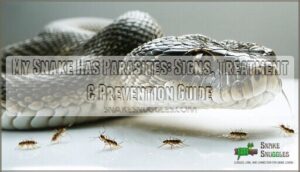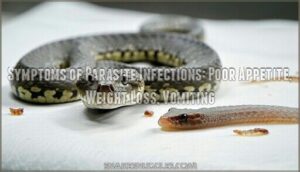This site is supported by our readers. We may earn a commission, at no cost to you, if you purchase through links.
 If your snake has parasites, you’ll likely notice decreased appetite, weight loss, abnormal feces, or lethargy.
If your snake has parasites, you’ll likely notice decreased appetite, weight loss, abnormal feces, or lethargy.
Don’t panic – parasitic infections are treatable but require prompt veterinary attention. Your vet will examine fecal samples to identify the specific parasites and prescribe appropriate deworming medication.
While you’re scheduling that appointment, quarantine your snake from other reptiles to prevent spread. Most parasites respond well to treatment when caught early, but the key is acting fast.
The tricky part isn’t just treating current infections – it’s understanding where these unwelcome guests come from and how to keep them away for good, which involves preventive measures.
Table Of Contents
- Key Takeaways
- Identifying Snake Parasites
- Understanding The Risks of Parasites
- Managing Snake Parasites
- Treating Snake Parasites
- Preventing Snake Parasites
- Frequently Asked Questions (FAQs)
- How to get rid of snake parasites?
- What is the fastest way to get rid of parasites?
- What should I do if my snake has mites?
- What are the symptoms of a parasite problem in a reptile?
- How do you know if your snake has a parasite?
- Can humans get parasites from snakes?
- Can you deworm a snake?
- How do you treat parasites in snakes?
- How can I tell if my snake has mites?
- Are snake parasites harmful to humans?
- Conclusion
Key Takeaways
- Act fast when you spot symptoms – Do not wait if you notice decreased appetite, weight loss, abnormal feces, or lethargy, as early treatment prevents serious complications.
- Get professional diagnosis and treatment – You will need a vet to identify specific parasites through fecal testing and prescribe the right anthelmintic medication, rather than attempting DIY solutions.
- Quarantine immediately to prevent spread – Isolate your infected snake from other reptiles and use separate equipment until treatment is complete and your vet confirms they are parasite-free.
- Focus on prevention through proper husbandry – Regular fecal testing every 3-6 months, feeding pre-killed frozen prey, maintaining clean enclosures, and quarantining new snakes for 30+ days will keep parasites away long-term.
Identifying Snake Parasites
Spotting parasites in your snake isn’t always obvious since many infections show no visible signs at first.
Silent invaders often strike hardest when you least expect them.
You’ll need to watch for subtle changes in appetite, weight, and behavior while getting regular fecal tests from your vet to catch these sneaky hitchhikers early, and understand that regular fecal tests are crucial.
Common Reptile Parasites: Roundworms, Hookworms, and Pinworms
Your snake’s digestive system can become home to several unwelcome guests. Roundworms, hookworms, and pinworms are the most common internal parasites that affect reptiles, with each presenting unique challenges for snake owners.
These helminths vary substantially in how they operate:
- Roundworm Lifecycle involves eggs that survive months in substrate, making reinfection likely without proper sanitation
- Hookworm Symptoms include anemia from blood loss as they attach to intestinal walls
- Pinworm Transmission occurs through contaminated environments, causing cloacal irritation
Some parasites are visible to the naked eye, while others require microscopic detection through Fecal Exams. Reptile Deworming becomes essential when these parasites multiply in unsanitary conditions.
Symptoms of Parasite Infections: Poor Appetite, Weight Loss, Vomiting
When you know what parasites look like, spotting the warning signs becomes much easier.
Watch for these telltale snake parasite symptoms that signal trouble:
- Appetite Changes – Your snake refuses food or shows dramatic appetite loss
- Weight Fluctuations – Noticeable weight loss despite regular feeding schedules
- Regurgitation Causes – Vomiting undigested meals or unusual regurgitation patterns
- Stool Abnormalities – Diarrhea, unusual consistency, or visible worms in waste
Lethargy Signs often accompany these symptoms, with infected snakes becoming less active than usual.
Veterinarians often use fecal sample analysis for diagnosis. Snake intestinal parasites don’t always announce themselves loudly, so monitoring these changes helps catch problems early.
Diagnosing Parasite Infections: Medical History, Clinical Signs, Fecal Samples
Accurate diagnosis requires three key components your veterinarian will use.
First, they’ll review your snake’s medical history to understand previous health issues and environmental factors. Next, clinical signs like weight loss, lethargy, or abnormal feces help identify potential problems.
Finally, fecal analysis through microscopic examination remains the gold standard for diagnosing snake parasites. Fresh fecal samples reveal parasite eggs, larvae, and other internal parasites snakes commonly harbor.
This screening importance can’t be overstated—many infections stay hidden without proper fecal testing and professional snake parasite diagnosis.
Understanding The Risks of Parasites
Many snake owners underestimate just how dangerous parasites can be for their scaly companions.
Don’t let tiny parasites become massive problems for your snake’s health.
These tiny invaders pose serious mortality risks that can escalate quickly without proper attention.
Snake parasites create a domino effect of health problems that compromise your pet’s entire system.
Here are three critical risks parasites pose:
- Immune suppression – Parasites weaken your snake’s natural defenses, making them vulnerable to secondary infections
- Organ damage – Internal parasites can cause irreversible harm to essential organs like the liver and intestines
- Chronic illness – Long-term infestations lead to persistent health issues that reduce lifespan
External parasites like mites create transmission vectors for diseases, while internal parasites drain essential nutrients.
The zoonotic risk means some parasites can potentially transfer to humans through improper handling.
Parasite transmission occurs through contaminated environments, infected prey, or contact with other reptiles.
Without intervention, these seemingly small problems snowball into life-threatening conditions that no snake parent wants to face.
Managing Snake Parasites
Once you’ve confirmed your snake has parasites, swift action prevents the infection from worsening and protects your other reptiles.
Managing parasites requires a combination of immediate quarantine measures, targeted treatment, and improved husbandry practices.
Quarantine and Parasitological Screening: Essential for Imported Snakes
When importing snakes, you’re rolling the dice with parasites unless you follow proper protocols.
Quarantine your new snake for at least 30 days in a separate, controlled environment while conducting thorough parasitological screening.
This parasite risk assessment includes fecal testing to detect internal parasites and visual inspection for external parasites.
Your screening protocol details should involve multiple fecal samples over the import quarantine length period before post-quarantine integration with other reptiles.
A dedicated space should guarantee optimal isolation practices.
Anthelmintic Therapy: Killing or Eliminating Parasites
Why wait when anthelmintic therapy can eliminate hidden threats?
Your snake needs deworming even if healthy—anthelmintics target intestinal parasites and snake worms effectively.
Veterinarians calculate proper dosage based on species and weight.
Common dewormer types include fenbendazole and ivermectin.
Monitor for side effects and resistance development.
Provide supportive care during treatment for maximum recovery.
Proper Husbandry: Reducing The Risk of Parasitic Infections
Beyond medication, your snake’s living conditions play a huge role in parasite prevention. Think of terrarium hygiene as your first line of defense against unwanted guests.
- Temperature Control: Maintain proper heat gradients to support your snake’s immune system
- Clean Environment: Remove waste immediately and disinfect surfaces weekly. It’s important to choose a suitable terrarium disinfectant for reptiles.
- Quarantine Protocols: Isolate new snakes for 30+ days before introducing them
- Regular Screening: Schedule fecal exams every 3-6 months for early detection
Ongoing Monitoring: Regular Fecal Testing and Wellness Exams
Consistent fecal testing and wellness exams serve as your first line of defense against snake parasites.
Schedule fecal testing every three to six months for healthy snakes, increasing frequency if you notice behavioral changes.
Here’s what makes ongoing monitoring essential:
- Early Detection Importance – Catching intestinal parasites before symptoms appear prevents serious health complications
- Preventative Care – Regular parasitological screening identifies asymptomatic infections that could worsen over time
- Veterinary Guidance – Professional wellness exams assess overall health beyond just parasite detection
This proactive approach keeps your snake healthier long-term.
Treating Snake Parasites
When you’ve confirmed parasites in your snake, quick treatment becomes your top priority.
Your vet will prescribe specific medications called anthelmintics that target the exact type of parasite affecting your pet.
Anthelmintics: Dewormers for Killing or Eliminating Parasites
Anthelmintics, commonly called dewormers, are your go-to medications for fighting internal parasites.
These drugs target specific parasite types through different mechanisms. Here’s what you need to know:
| Anthelmintic | Target Parasites | Common Dosage |
|---|---|---|
| Fenbendazole | Roundworms, some tapeworms | 3-5 consecutive days |
| Ivermectin | Broad spectrum parasites | Veterinary-determined injection |
| Praziquantel | Tapeworms | Single oral/injection dose |
Dosage Calculation requires veterinary expertise since snake weight and species matter. Side Effects are generally minimal with proper use, though Drug Interactions can occur.
Dewormer Resistance develops with improper use, so follow prescribed protocols exactly. Preventative Use isn’t recommended without confirmed infections, as overuse creates resistant parasites.
Closely Following Veterinarian Instructions: Medication Administration
When administering snake parasite medication, precision becomes your snake’s lifeline. Veterinary care guarantees proper Dosage Accuracy and Administration Methods suited to your pet’s specific needs.
Follow these critical steps for effective snake parasite treatment:
- Measure doses precisely – Use syringes or droppers provided by your vet for exact measurements
- Time administration correctly – Give anthelmintics at prescribed intervals, not when convenient
- Monitor for side effects – Watch for lethargy, regurgitation, or unusual behavior during Treatment Duration
- Store medication properly – Follow Storage Guidelines to maintain potency and safety
- Complete the full course – Don’t stop early even if symptoms improve
Missing doses or incorrect timing can lead to treatment failure and Potential Side-Effects. Your vet’s instructions aren’t suggestions—they’re your roadmap to eliminating snake parasites safely. Knowing that anthelmintics eliminate parasites is vital for understanding the treatment’s purpose.
When in doubt, call your veterinary team rather than guessing. Proper snake medication administration makes the difference between successful treatment and prolonged illness.
Feeding Pre-Killed Frozen Prey: Preventing Parasite Infections
Prekilled frozen prey eliminates live prey source parasites that commonly infect snakes.
Freezing kills up to 99% of parasites when stored at -20°C for 24-48 hours.
This parasite prevention method protects your snake diet from contaminated feeder insects.
You can find a variety of options online.
Proper thawing methods and safe handling maintain nutritional impact while preventing snake parasites transmission.
Quarantining New Reptiles: Preventing Parasite Spread
Properly quarantining new reptiles always prevents parasite spread and protects your existing collection. Think of quarantine as your first line of defense against silent spreaders that could devastate your reptile family.
Quarantine Duration: Keep new snakes separate for at least 30 days minimum, preferably 60-90 days for complete safety.
Enclosure Setup: Use simple, easy-to-clean containers with paper towels as substrate for monitoring purposes.
Screening Protocols: Schedule veterinary fecal exams within the first week to detect hidden snake parasites early.
Hygiene Practices: Wash hands thoroughly and use separate tools when handling quarantined reptiles to prevent cross-infection.
Stress Reduction: Maintain quiet, stable conditions to help new arrivals adjust while revealing any underlying reptile parasites.
Preventing Snake Parasites
Prevention starts before parasites become a problem in your snake’s enclosure. You’ll want to establish regular inspection routines and quarantine protocols that stop these unwelcome guests from settling in permanently.
Regularly Inspecting Reptiles for Signs of Parasites
Regular visual inspection of your snake can catch snake parasites before they become serious health problems.
Check your pet weekly for early detection of issues like snake mites, which appear as tiny black or red dots crawling on the skin, or ash-like dust on scales.
During your visual inspection, look for these warning signs:
- Skin abnormalities – Small moving specks, unusual bumps, or scaling issues that weren’t there before
- Behavioral changes – Reduced appetite, excessive rubbing against objects, or unusual lethargy
- Physical symptoms – Weight loss, abnormal shedding, or changes in stool appearance
Make visual inspection part of your regular snake care routine.
Check around the eyes, under the chin, and between scales where snake mites often hide.
Preventative measures like this help you spot reptile parasites before they multiply and cause serious snake health problems.
Regular enclosure cleaning is essential to reduce the risks of many diseases.
Document any changes you notice to share with your veterinarian during routine check-ups.
Isolating Infected Reptiles: Preventing Cross-Infection
Once you’ve identified infected snakes, immediate isolation prevents disease spread to healthy reptiles.
Set up separate equipment for each snake and follow strict hygiene protocols between handling sessions.
Quarantine duration depends on treatment progress, but maintain isolation until veterinary clearance confirms your snake is parasite-free.
| Isolation Factor | Infected Snake | Healthy Snakes |
|---|---|---|
| Housing | Separate enclosure, away from others | Original habitat, monitor closely |
| Equipment | Dedicated tools, feeders, water bowls | Clean equipment, disinfect regularly |
| Handling | Wash hands thoroughly after contact | Handle first, before infected animals |
| Feeding | Isolated feeding schedule | Normal routine, separate prey items |
| Monitoring | Daily health checks, treatment tracking | Weekly inspections for symptoms |
Enclosure sterilization becomes your top priority during snake quarantine.
Minimize contact between infected and healthy animals by handling sick snakes last.
This cross-infection prevention strategy protects your entire collection from snake disease spread.
Using Appropriate Quarantine Protocols: Newly Acquired Reptiles
Bringing home a new snake means starting with proper quarantine protocols to prevent parasite spread. You’ll need to isolate your new reptile for at least 30 days before introducing them to other pets.
This quarantine duration gives you time to spot any health issues. A vital part of this process involves setting up a proper snake quarantine tank.
Key quarantine steps for snake parasite prevention:
- Enclosure Setup – Use a separate, clean terrarium away from other reptiles
- Monitoring Signs – Watch daily for appetite changes, abnormal stools, or lethargy
- Preventative Treatment – Schedule a vet visit for fecal testing and possible deworming
- Reducing Stress – Keep the quarantine environment quiet and maintain proper temperatures
Frequently Asked Questions (FAQs)
How to get rid of snake parasites?
Ironically, getting rid of parasites means you’ll need professional help, not DIY fixes.
Visit a reptile vet immediately for proper diagnosis and prescribed anthelmintic medication.
Clean the enclosure thoroughly and follow all treatment instructions exactly.
What is the fastest way to get rid of parasites?
You’ll need a veterinarian’s diagnosis first, then follow their prescribed anthelmintic treatment plan. There’s no safe DIY shortcut – proper medication and dosage are essential for effective parasite elimination.
What should I do if my snake has mites?
Like unwelcome guests at a party, mites need immediate eviction.
Isolate your snake, clean the enclosure thoroughly, and apply veterinary-prescribed treatments like Ivermectin spray.
Repeat treatment after two weeks to eliminate any remaining mites and ensure the snake is completely mite-free.
What are the symptoms of a parasite problem in a reptile?
You’ll notice poor appetite, weight loss, vomiting, and abnormal stools. Look for lethargy, regurgitation, breathing difficulties, and behavioral changes like increased hiding or aggression in your reptile.
How do you know if your snake has a parasite?
Watch your snake like a detective hunting clues.
You’ll spot parasites through weight loss, poor appetite, regurgitation, abnormal feces, lethargy, or visible mites crawling on skin.
Schedule vet fecal testing for confirmation.
Can humans get parasites from snakes?
Yes, you can catch some parasites from snakes, though it’s uncommon.
Salmonella is the main concern through handling or contact with contaminated surfaces.
Always wash your hands thoroughly after snake contact, as this is a key step to prevent the spread of Salmonella.
Can you deworm a snake?
Yes, you can deworm a snake, but it requires veterinary supervision.
Anthelmintic medications like fenbendazole or metronidazole are used to treat different parasite types.
A vet will diagnose the specific parasites through fecal testing and prescribe appropriate treatment.
How do you treat parasites in snakes?
Parasite treatment absolutely requires professional veterinary care – you can’t wing this one!
Your vet will prescribe specific anthelmintics like fenbendazole for internal worms or topical treatments for external parasites.
Plus thorough enclosure sterilization.
How can I tell if my snake has mites?
Look for tiny black or red dots moving on your snake’s skin, especially around the eyes, mouth, and vent areas.
You’ll also notice ash-like dust on scales and increased rubbing behavior.
Are snake parasites harmful to humans?
Most snake parasites can’t directly infect humans, but you should still wash your hands after handling your snake. Some parasites like Salmonella bacteria can transfer to people through contact.
Conclusion
What happens when your snake recovers from parasites? You’ll have learned valuable lessons about prevention that’ll keep your pet healthy long-term.
Successfully treating "my snake has parasites" situations requires quick veterinary care, proper medication, and strict quarantine protocols.
The real victory comes from implementing regular fecal testing, maintaining proper husbandry, and quarantining new reptiles.
With consistent monitoring and preventive measures, you can protect your snake from future parasitic infections and guarantee a healthier, happier pet, which is the ultimate goal of proper care.
- https://www.ncbi.nlm.nih.gov/pmc/articles/PMC3118381/
- https://www.outbackreptiles.com/2020/01/should-i-treat-my-wild-caught-animal-for-parasites/
- https://www.reptilesmagazine.com/understanding-reptile-parasites/
- https://meridian.allenpress.com/jhms/article/10/3/4/137263/The-Biology-Clinical-Significance-and-Control-of
- https://www.biotaxa.org/pja/article/view/202116












